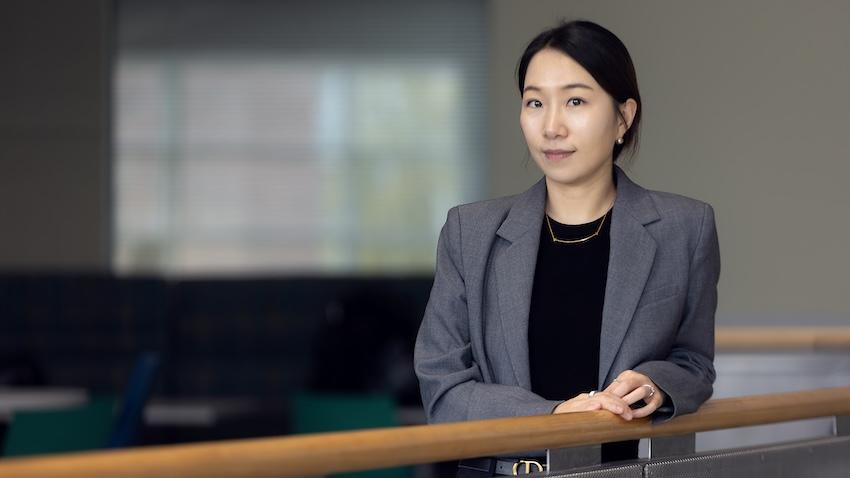Research as the Practice of Freedom
SPEAKER: Stacy Branham, Professor of Informatics at the University of California, Irvine
Georgia Insurance Claims Database Provides Health Care Cost Comparisons
Jan 21, 2026 —

Georgia residents now have a new way to compare the estimated costs paid for a large variety of health care services in the state, thanks to a resource created by the Georgia All-Payer Claims Database. (iStock photo)
Georgia residents now have a new way to compare the estimated costs paid for a large variety of health care services in the state, thanks to a searchable “shop for care” resource launched as part of the Georgia All-Payer Claims Database (GA APCD).
The Georgia APCD Cost Comparison Tool (apcd.georgia.gov/cost-comparison-tool) contains information on more than 200 different medical procedures ranging from cardiac stress tests and childbirth to knee replacement and colonoscopies. The resource provides information on the median cost paid for the procedures statewide, along with information on what individual medical facilities and professional providers have been paid for each type of procedure.
For each procedure, the tool identifies medical facility providers nearest to the consumer and includes facility ratings collected by the Centers for Medicare & Medicaid Services (CMS). For each facility providing a specific service, the comparison data includes the median cost for the procedure and the range of costs that were paid. Costs can be filtered by payer category, including commercial, Medicare, and Medicaid. While that data is understandably incomplete and includes caveats, developers of the new service say it provides a much-needed resource for Georgians facing a decision on a costly medical procedure.
“In health care, there are a lot of factors that can drive cost and it’s not always a straightforward equation, so it’s worth doing the research,” said Dr. Jon Duke, an M.D. and principal research scientist in the Georgia Tech Research Institute’s (GTRI) Health Emerging and Advanced Technologies Division, which administers the APCD for the state of Georgia. “This is really just one part of health care decision-making, and it will help patients be more proactive advocates for themselves when considering potential options for care.”
Dr. Duke is also a faculty member in Georgia Tech's Institute for People and Technology. You can read the full article published by the Georgia Tech Research Institute here.
Computational Ecosystems: Advancing Human Values Through Integrative Computing and Changing Practice
SPEAKER: Haoqi Zhang, Associate Professor in Computer Science and Design at Northwestern University
Accompaniment in Human-Centered Design: From Digital Interventions to Community and Dialogue
SPEAKER: Susan Wyche, Associate Professor, Department of Media and Information, Michigan State University
Everyday Data and AI Practices: A Novel Approach to Studying Workplace Computing
SPEAKER: Betsy DiSalvo, Professor in the School of Interactive Computing at Georgia Tech
New LLMs Could Provide Strength-based Job Coaching for Autistic People
Jan 15, 2026 —

People with autism seeking employment may soon have access to a new AI-based job-coaching tool thanks to a six-figure grant from the National Science Foundation (NSF).
Jennifer Kim and Mark Riedl recently received a $500,000 NSF grant to develop large language models (LLMs) that provide strength-based job coaching for autistic job seekers.
The two Georgia Tech researchers work with Heather Dicks, a career development advisor in Georgia Tech’s EXCEL program, and other nonprofit organizations to provide job-seeking resources to autistic people.
Dicks said the average job search for people with autism can take three to six months in a good economy. It can take up to 18 months in a bad one. However, the new LLMs from Georgia Tech could help to reduce stress and fast-track these job seekers into employment.
Kim is an assistant professor who specializes in human-computer interaction technology that benefits neurodivergent people. Riedl is a professor and an expert in the development of artificial intelligence (AI) and machine learning technologies.
The team’s goal is to identify job-search pain points and understand how job coaches create better employment prospects for their autistic clients.
“Large-language models have an opportunity to support this kind of work if we can have more data about each different individual strength,” Kim said.
“We want to know what worked for them in specific settings at work, what didn’t work, and what kind of accommodations can better help them. That includes how they should prepare for interviews, how they can better represent their skills, how they can address accommodations they need, and how to write a cover letter. It’s a broad range.”
Dicks has advocated for neurodivergent people and helped them find employment for 20 years. She worked at the Center for the Visually Impaired in Atlanta before coming to Georgia Tech in 2017.
She said most nonprofits that support neurodivergent people offer career development programs and many contract job coaches, but limited coach availability often leads to long waitlists. However, LLMs could fill this availability gap to address the immediate needs of job seekers who may not have access to a job coach.
“These organizations often run at a slow pace, and there’s high turnover,” Dicks said. “An AI tool could get the job seeker quicker support. Maybe they don’t even need to wait on the government system.
“If they’re on a waitlist, it can help the user put together a resume and practice general interview questions. When the job coach is ready to work with them, they’re able to hit the ground running.”
Nailing the Interview
Dicks said the job interview is one of the biggest challenges for people with autism.
“They have trouble picking up on visual and nonverbal cues — the tone of the interview, figuring out the nuances that a question is hinting at,” she said. “They’re not giving the warm and fuzzy vibes that allow them to connect on a personal level.”
That’s why Kim wants the models to reflect a strength-based coaching approach. Strength-based coaching is particularly effective for individuals with autism. Many possess traits that employers value. These include:
- Close attention to detail
- Strong technical proficiency
- Unique problem-solving perspectives
“The issue is that they don’t know how these strengths can be applied in the workplace,” Kim said. “Once they understand this, they can communicate with employers about their strengths and the accommodations employers should provide to the job seeker so they can successfully apply their skills at work.”
Handling Rejection
Still, Kim understands that candidates will need to handle rejection to make it through the search process. She envisions LLMs that help them refocus their energy and regain their confidence after being turned down.
“When you get a lot of rejection emails, it’s easy to feel you’re not good enough,” she said. “Being constantly reminded about your strengths and their prior successes can get them through the stressful job-seeking process.”
Dicks said the models should also be able to provide feedback so that candidates don’t repeat mistakes.
“It can tell them what would’ve been a better answer or a better way to say it,” Dicks said. “It can also encourage them with reminders that you get 100 noes before you get a yes.”
You’re Hired, Now What?
Dicks said the role of a job coach doesn’t end the moment a client is hired. Government-contracted job coaches may work with their clients for up to 90 days after they start a new job to support their transition.
However, she said, sometimes that isn’t enough. Many companies have probationary periods exceeding three months. Autistic individuals may struggle with on-the-job training or communicating what accommodations they need from their new employer.
These are just a few gaps an AI tool can fill for these individuals after they’re hired.
“I could see these models evolving to being supportive at those critical junctures of the probationary period being over or the one-year job review or the annual evaluation that everyone dreads,” she said.
Dicks has an average caseload of 15 students, whom she assists in landing jobs and internships through the EXCEL program.
EXCEL provides a mentorship program for students with intellectual and developmental disabilities from the time they set foot on campus through graduation and beyond.
For more information and to apply, visit EXCEL’s website.
Conversations@TechSquare: What becomes possible when research is allowed to experiment in cultural spaces?
Solar-powered Façade Panel System Wins Seed Grant Award
Jan 06, 2026 — Atlanta, GA

Pictured are Christian Coles (left) and Moinak Choudhury (right).
The Institute for People and Technology (IPaT) and the College of Design (CoD) awarded a seed grant to Christian Coles, lecturer in the School of Architecture; Moinak Choudhury, Ph.D., lecturer in the School of Literature, Media, and Communication (LMC); and Janelle Wright, environmental justice programs manager, at the West Atlanta Watershed Alliance (WAWA). Coles will serve as the principal investigator with Choudhury and Wright serving as the co-principal investigators.
Their project, “Designing Futures: Afrofuturist Co-Creation with AI for Community-Led Facade Design” will be realized during a 16-week design studio (ARCH 4016) class that will take place during fall 2026 and serve senior undergraduate architecture students. Participants from diverse majors will join through the Building for Equity and Sustainability Vertically Integrated Project (VIP) team, in partnership with the Center for Sustainable Communities Research and Education (SCoRE). Pre-planning tasks will occur spring semester in preparation for the fall studio class.
The studio class will collaborate with Moinak Choudhury and students in LMC 3403, who bring expertise in technical communication, responsible AI use, and community-based learning to co-create engagement materials and public-facing documentation that strengthen the project’s interdisciplinary links between design, sustainability, and communication.
The final result of the project encompasses students who will design and install a modular, solar-powered façade panel system for the outdoor classroom on WAWA’s campus. This project extends work done by a previous Georgia Tech VIP team.
The panels will serve multiple functions: participatory community engagement, artistic expression, and climate regulation. This project will advance the classroom toward its intended vision as an Afrofuturist learning space with technological nods to the Keneda Building on Georgia Tech’s campus. With the help of this seed grant, interdisciplinary team members will delve into design, engineering, computing, communication, and community partnership.
Walter Rich
Will AI Change Cartography, Or Will Cartographers Change AI?
Anthony Robinson, Ph.D.
E. Willard & Ruby S. Miller Professor of Geography, Director of Online Geospatial Education Programs, and Director of the GeoGraphics Lab at Penn State
